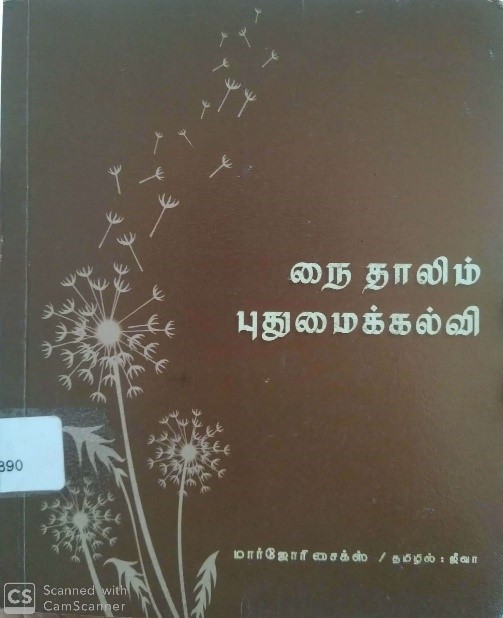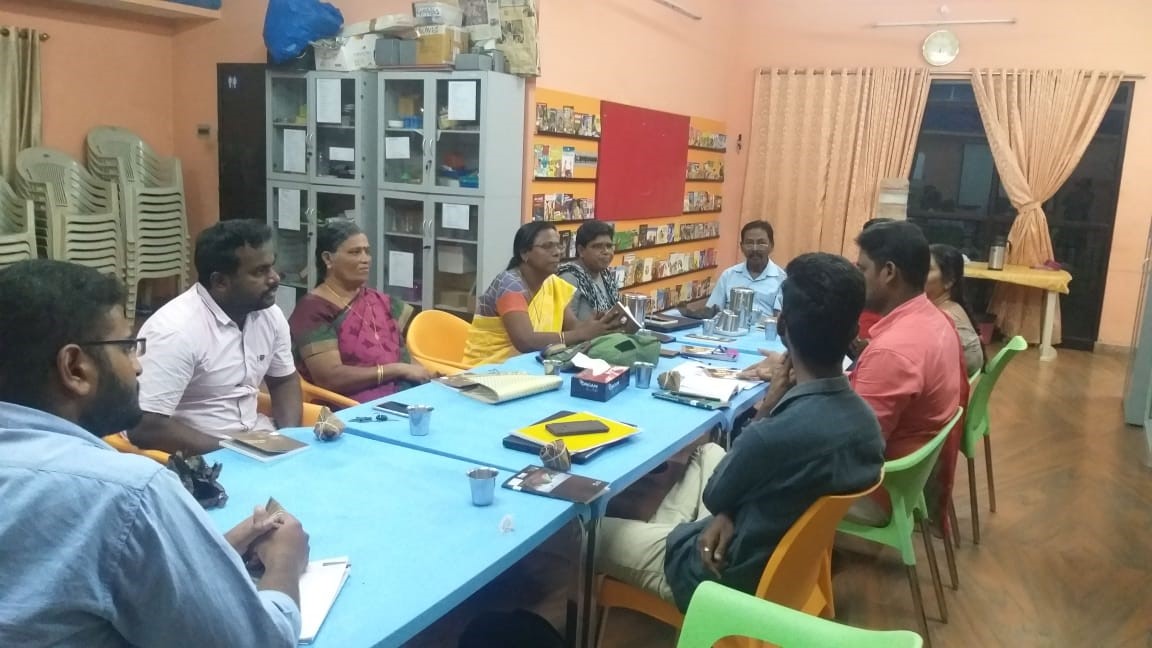As part of the reading review series, teachers read and reviewed the book Nai Talim: Puthumaikalvi (Nai Taleem: New Education), which is a Tamil translation of The Story of Nai Talim: Fifty Years of Education at Sevagram written by Marjorie Sykes. Two teachers had volunteered to conduct this review and facilitate its discussion, one of whom teaches history at a high school (Ms.C.Patcheammalle) while the other is a primary school teacher (Mr.R.Karthikeyan). A brief summary of this book is given below.
Mahatma Gandhi and his ideals serve as an important discussion point, both politically and socially. He had spoken on several areas such as education, health, equality, self-respect, self-reliance, and so on. The said book’s author had travelled to India to work as a teacher in Madras; in the process, she became interested in the education system envisioned by Gandhi. Moreover, she actively participated in India’s freedom struggle. 
A few overarching ideas presented by the books are as follows: (i) a teacher never completes learning; each day his/her interactions with the world teaches something new. (ii) A teacher is not someone who only teaches subjects assigned to him/her; understanding certain life skills and the way to develop the same is crucial. (iii) Education is not merely what is taught using a textbook; formal books and means can satisfy learning, but unless a teacher facilitates learning apart from textbooks, no real change can take place. (iv) If a teacher says his/her students are good, it is due to not only textbooks but also something more that made the learners better.
Furthermore, the aforementioned book deals with hygiene and the importance of this topic’s inclusion in educational curriculums. It also questions the economy that is driven by profits derived from selling alcohol and the way such capital can ethically help in developing the country’s education system, for instance, by living a simple life and reducing individual consumption. Taking ownership of what we talk about and do in classrooms is also important; if we expect learners to respect us, we must reflect upon ourselves as well. What one learns in the classroom also shares a connection with one’s life. This book discusses an example in this regard: ‘Through the act of spinning a thread, history can be taught’. To elaborate this notion, the primary school teacher narrated a recent example from his school: ‘The school walls were getting painted, and the students were observing the process. In a few days, they were able to tell what colour combinations can be made, the thickness of brushes, strokes, and much more. While pondering the reason my students felt so interested in this process, I realised that learning is interesting when the learner is not judged.’ 
A discussion on what lead Gandhi to write such ideals was also conducted, in addition to a dialogue on his politics. There might be many opinions that do not accept various views concerning Gandhi. However, when it comes to education, his experiments are quite interesting. He had started several of these experiments while in South Africa and continued them even after returning to India. These experiments have led many people to start schools based on such ideologies; for example, Tamil Nadu has various schools that operate on Gandhian principles. The ideals proposed by Gandhi are based on equality in education and ways to achieve an individual’s full potential.
After reading this book, the facilitator shared that she still thinks she has not become a complete teacher yet, and our education system has numerous issues that need to be resolved. She further divulged that she had started reading this book despite holding a dislike towards Gandhi. However, while reading, she felt that the perspectives shared in this book are highly relevant even today. The book states that children should join school only after they are seven years old, whereas our schools admit kids as young as two and a half years old. Many ideas presented in this book reflect the new education policies adopted in our country.
‘Education needs to be liberated from the classrooms’: This is an interesting quote from the book. When education only occurs inside the four walls of a classroom, it fails to fully liberate a learner. To this end, education offered in one’s mother tongue serves as an effective means of liberation. However, the Indian education system still maintains English as our primary medium of communication, which enslaves our learners. Moreover, Gandhi’s idea that each classroom should not have more than 25 to 30 learners is very progressive, though this is not the case even now. During the book review, the significance of including vocational skills in the general curriculum along with other subjects and its importance in self-sufficient learners were also discussed. In this regard, our education system falls short on being fair to ensure justice for all.
The said book also discusses work in relation to education, asserting that manual work should be assigned to students in schools, who should take turns to complete the same. This notion must have been revolutionary when it was written. Unfortunately, this aim has not been achieved till date. In this respect, we must ask ourselves what prejudices we hold within us that are against this principle.
The issue pertaining to centralised power was also addressed. In a country, power should not be vested centrally; decentralisation ensures ownership and participation in decision-making. Further, the issue of students using intoxicants, which was prevalent back then, is widespread even now. In addition, the book suggests that including vocational training would keep students engaged in learning and help them escape the trap of substance abuse.
Subsequently, the following issues were discussed during the session. If an individual can run faster than others who are slower, he/she is deemed as successful in our classrooms. However, will such a race help any learner? What precedent does it set for the development of each learner? What kind of sensitive choices do we make in our classrooms while teaching?
We celebrate what is good, but when it comes to practicing it, we fail on several occasions. Freedom allows students to express themselves in government schools; offering students plenty of opportunities to keep this feeling alive among them is important, because it gives them confidence to try and learn new things.
The discussion concluded by selecting the next book to be reviewed. One of the teachers suggested that a book on the experiences of a Gandhian school should be chosen, following which two teachers volunteered to read and present their understanding of the same in the next session.
Term:
- Log in or register to post comments